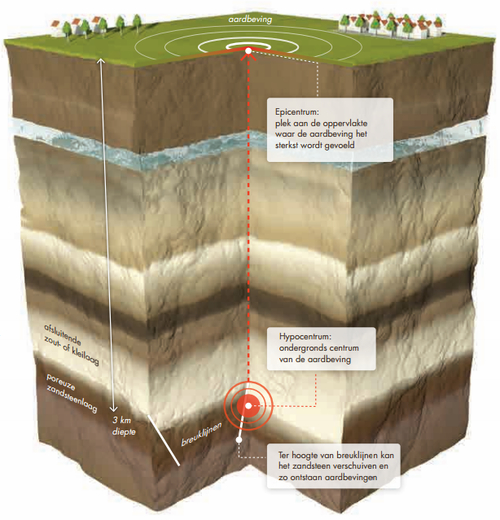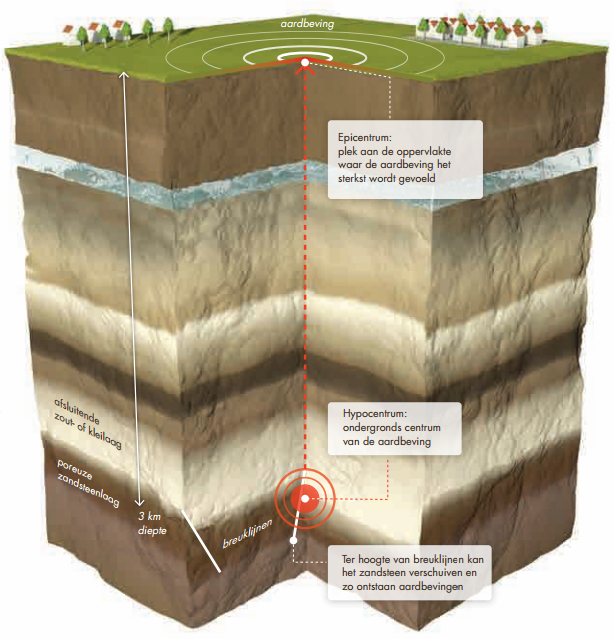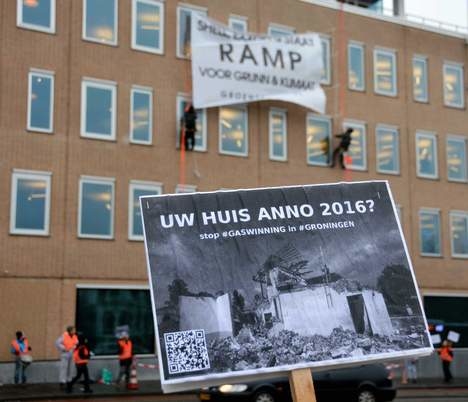One of the biggest gas fields in the world is located in Groningen, the Netherlands. Gas in this area has been extracted by the NAM, a private company owned by Shell and ExxonMobil, since 1963, after the fields’ discovery in 1959. The gas field takes up almost 900 square kilometres, covering a big part of the county, and contains nowadays approximately 727 billion cubic metres, less than one third of the initial amount. The quick decrease of the gas supply can be subscribed to the gas fields’ importance to the Dutch national economy; the drilling of gas since 1963 resulted in 265 billion euros profit for the Dutch State and in 2014, the Dutch government earned 15 billion euros from the Groningen gas fields [1]. Lucky Netherlands, you would think (actually, they are). But how about the negative consequences of the gas drilling in Groningen?
Figure 1. The effect of gas extraction on earthquakes

Following the principle of seeking consensus and securing public values, the NAM and the Dutch State should ask themselves how the risk of earthquakes can be minimized to secure the safety of the residents of Groningen and surroundings. They should listen to the opinions of the local population towards a better and sustainable policy on the gas drilling. But do they? Does the NAM listen to the residents of Groningen? Is there the will to make every effort to secure the safety of the Groningen habitants? No! On the contrary, recent study of the Dutch Safety Board shows that the NAM has neglected safety risks for more than 50 years. Together with the State, they were only interested in the revenues they earned [3]. This is a great violation of Responsible Innovation! Instead of seeking consensus with the residents and innovating the gas extraction in a responsible way that’s taking common values and emotions into account, the NAM prefers financial interest and costs as low as possible to human well-being.
Figure 2. Protest against gas drilling
Another point of discussion is the content of the current, often heated, debates about the gas extraction in Groningen. All the solutions thrown in the arena are about whether the gas tap has to be turned off. What I do not hear in those debates are solutions, innovations other than shutting off the gas supply. What about innovations in the gas drilling? Can the space, created in the sandstone layer, be filled with another gas or material so the layer won’t drop? Can there be found another method so earthquakes won’t occur anymore? 265 billion euros profit and a lot of investments in increasing efficiency of the extraction but how about investments in the safety of gas drillings?
What I propose: decrease the amount of gas being drilled in Groningen and invest more in alternative energy sources. If the focus now mainly stays on improving gas extraction, the development of alternative sources, like wind and solar power, will get out of the picture while these alternative energy sources are the real sustainable and safe energy producers. And about filling gaps in expert-laypeople debates: in the case of the Groningen gas extraction there is no such gap. Both parties recognize the dangerous consequences of the gas drillings but the NAM keeps drilling! And I don’t think this is going to change. Why? Because policy nowadays doesn’t protect common public values, morals and emotions, it protects the self-interest of the policymakers.
Sources
[1] http://www.nu.nl/politiek/3980615/moet-u-weten-groningse-gas-en-bevingen.html
[2] http://www.groenerekenkamer.nl/1819/aardbevingen-nederland-door-gaswinning/
[3] http://www.volkskrant.nl/economie/onderzoeksraad-risico-s-gaswinning-groningen-genegeerd~a3853875/

